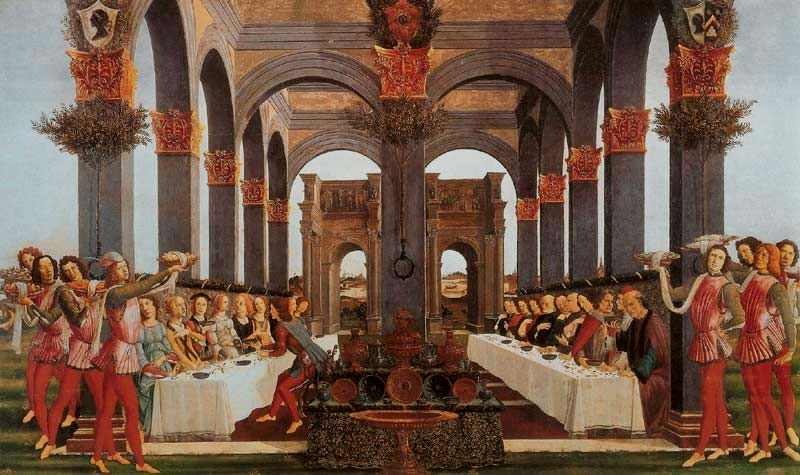
Christianity of necessity has a lot of negative messaging. The call to take up the cross sets the tone. It promises a life of struggle with one’s own flesh, with the devil’s accusations and doubts, and with the world’s mockery. “Through many tribulations we must enter the kingdom of God.” Yes, we are sheep led to the slaughter, and very often, as in Nigeria today, this results in literal slaughter. Why would anyone respond to that message?
Obviously, it’s because the positive messaging far outweighs the negative. What are those positive messages? Eternal life for one. Also eternal joy, without tears, thirst, or hunger. St. Paul describes what awaits as above or beyond anything we can ask for or even think. Spend all your days asking the Lord for heavenly gifts, or just thinking about them, and what you actually receive will be far better. That’s difficult to even contemplate…which is exactly how St. Paul describes it.
One of the greatest positive images we have of the world to come is that of a great banquet. We get in the Gospel for this week, which is supported by Old Testament prophecy and later the book of Revelation. Heaven will be a great, eternal banquet. What is it about feasting that is so wonderful? I see three dominant things: grace, comfort, and conversation.
The grace aspect is that, for you to eat, usually someone or something else has to sacrifice something. Whether plant or animal, something has to give its life for you to eat. And to prepare the meal, someone has to sacrifice time. Usually they do it out of love and hospitality, even as you do it for them. But the whole event is a lovely one that usually brings a lot of joy, for both giver and receiver. Of course, in the Lord’s Feast, He Himself is both the host and the willing victim who offered His flesh to eat.
The bottom line is, when you go to a banquet, you enjoy the sacrificial grace of another. You rejoice in the grace, and it’s a joyful thing to experience.
Eating is a concrete expression of the fact that God set up the world as a network of grace. Because of the creation’s physicality, everything is contingent on everything else to some degree. The very ground I walk on grants the gift of pushing up, so I don’t submerge into the depths with each step. Each breath makes me the recipient of gifts from my lungs, my blood, my muscles, gravity, the trees, and the air. Food works similarly. Lots of things conspire together in the physical world for me to eat.
The comfort aspect is simply the comfort you get eating. Hunger is scary. Hunger is uncomfortable and reminds us we’re mortal. Fasting is a way of bringing our mortal nature to the fore, putting us in a posture of utter need before the Lord, punctuating our petition, “Give us this day our daily bread” and imbuing it with spiritual meaning.
Eating ends the scariness. There’s a physical joy in eating, a euphoria almost. Add the drinking of wine, “that makes the heart glad,” and we’re taken to a new level. Add the infusion of that food and drink with Christ’s body and blood, and the eternal life it brings, and now eating becomes a sublime joy.
As far as conversation goes, consider how eating is one of the few activities in the modern era drawing people together in fellowship. We have a lot of isolating forces at work, but eating remains an activity people prefer to do with others. Yes, far too often we see people gathered together at a meal and each one is buried in their smart phones, but at least they’re together. And aren’t some of the best conversations ones had while gathered around the dinner table?
That the world to come will be an eternal banquet lets us know it will be a place of grace, comfort, and conversation. Of course Christ is providing the meal, offering eternal grace. The comfort will be rich indeed. And imagine the heavenly conversation offered, from saints, from Old Testament characters, from historical characters, from our forefathers and foremothers. Given eternity, imagine the depths of good conversation to have with someone like Charlemagne, or Constantine, or Cyril of Alexandria. Imagine what you’ll be able to offer in good conversation.
It’s interesting that the entire Biblical saga began with rules about eating. One tree we could eat from, another we could not. One tree was grace and life. The other was not grace and death. One tree premised good conversation about life. The other introduced into human conversation this previously unknown concept of “evil,” directing the human mind toward everything the created world is not, which is nothingness. Eating to nothingness sets the new standard for life in this fallen world. “Feasting” on things which always “look good for eating,” but bring nothing.
This was the sin of those who ignored the man’s invitation. They were concerned about things which gave the appearance of responsible living, but kept them from the supper.
This week’s Gospel answers last week’s Gospel on Lazarus and the Rich Man. That Gospel centered on the table as well. It demonstrated how the table should not be administered, or perhaps how the Jews were administering it with regard to the Gentiles. It excluded the beggar. This week shows the “certain man” properly administering the table, but the recipients of his grace were not worthy. They didn’t know they were beggars, so the man has to go out and find the beggars. The man this week will find Lazarus from last week, and Lazarus will eat.